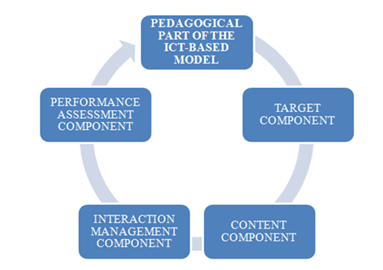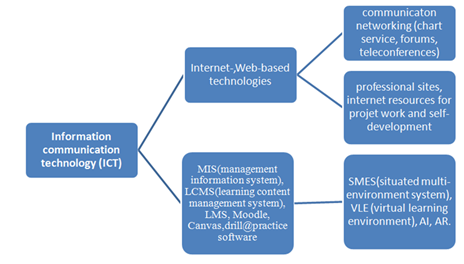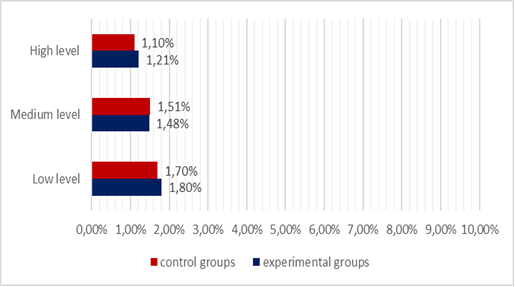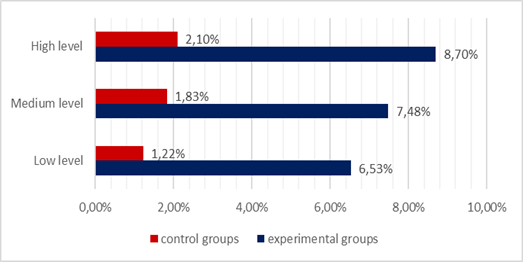Abstract
This paper focuses on different aspects of ICTs used in SLL, analyzing possible ways to streamline digital educational environment. In the university sector, ICT has already made an important impact, however, despite some exceptions there is still an important social preference for traditional educational models, as there are few real examples of educational models, based on different ICTs, that are effectively integrated into SLL process, fostering students’ linguistic abilities and enhancing the skills of social and professional interaction. This situation predetermined the field of the research and called for the development of the model, tailored to arrange students’ social and professional interaction in different forms, using varied ICTs. Hence, the purpose of the paper is to design ICT-based model for SLL in higher schools and verify both the viability and effectiveness of this model and benefits gained by all the stakeholders of the educational process. The authors introduce the forms of the organization of students' interaction (initiation to interaction, imitation of social and professional interaction, authentic interaction); provide the characteristics of the pedagogical support and resource provision of each of them. The authors then describe the implementation of this model and results achieved. Positive outcomes were shown regarding the effectiveness of the developed model, which manifested in the positive dynamics of the studied indicators of personal and professional growth of students who participated in the experiment.
Keywords: Communication technologies, information technologies, ICT-based model, Second language learning
Introduction
In the context of global changes, the knowledge of a foreign language at the level of international standards, competence in the field of foreign language professional communication, the ability to professional intercultural interaction become relevant for the sphere of foreign language training of specialists of any direction.
Therefore, departments and centers, engaged in SLL, should set the goal of technologization of the SLL process that, in its turn, involves the solution of a number of interrelated problems, such as:
- the use of innovative teaching technologies in order to integrate the language and profile training of students in the process of their professional development;
- use of monitoring and evaluation criteria corresponding to international language standards (Pan-European Competence Scale);
- development of independent work and self-assessment skills of the student; creation of conditions for the development of self-education and self-actualization of personality, motivation for personal achievements.
Problem Statement
The process of digitalization of education and integration of Russian education into the international educational system predetermines the development of modern language education in a non-linguistic university, what is more, it sets a completely new level of requirements for the introduction of new communication and information technologies and their quality, both in procedural aspect and the gained results.
A study of scientific and pedagogical sources related to this problem as well as an analysis of the practical activities of higher educational institutions, allowed us to outline some contradictions, namely, between the need to study the possibilities of using new technologies in teaching, accompanying resource provision and the lack of research on this problem in pedagogical science and practice; between the need for the student to interact with educational information by means of information and communication technologies and the insufficient level of information readiness of teachers to implement it in practice; between the variety of new forms of teaching students based on new information technologies and their weak implementation in the educational process of non-linguistic universities.
In this regard, there is a need to develop pedagogical and information technologies and tools created in a common conceptual and technological way, ensuring their close integration.
The need to resolve these contradictions, the importance and relevance of the problem under consideration in the field of higher pedagogical education determined the research topic: ICT-based model of SLL (second language learning) in higher schools.
Research Questions
Methodically competent use of modern information technologies is an unlimited reserve for improving the efficiency and quality of training. With the introduction of information and communication technologies, the education process is carried out in a fundamentally different environment. This means that technology is no longer just an addition, it transforms education in accordance with the needs of the information society with significant consequences for the education system in the organization of the educational process, teaching methods and the content of training (Vasilenko, 2010) Modern means of education based on information technology allow you to build individually-oriented learning (Makuseva, 2012).
Modern information technologies differ significantly from their predecessors, they are constantly changing and lead to a revision of the principles and methods of educational interactions (Sungurova, 2013).
To develop an ICT-based model of foreign language teaching, it was necessary to get answers to the following questions:
RQ 1 – What structural components are included in this model?
RQ 2 – What ICT are to be used in this model?
RQ 3 – Does the ICT-based model meet the basic principles of pedagogical technology?
A substantial analysis of the scientific literature has shown that there are publications of scientists on the problem of research, which highlight some of its aspects. The issues of introducing new information technologies into the educational process are considered in scientific papers of (Dmitrienko & Mikhnova, 2016; Frolov, 2016; Hodaňová et al., 2020; etc.) the influence of informatization on the content of education is studied by (Begley, 2011; Harris et al., 2009; Kuban, 1998; Kemp & Sorrow, 2014; Lai, 2008; Oliver et al., 2012; Shvetsova, 2021; Wei & Hindman, 2001; Williamson et al., 2020; etc.) the possibilities and role of information and communication technologies in the educational process are revealed in the works of (Morozova et al., 2020; Williamson et al., 2020; Zaguzov, 2000).
At the same time, pedagogical and psychological features of the use of ICTs, depending on the forms of organization of intercultural social and professional interaction of students in the course of SLL in higher schools have not been studied.
The authors believe, that it is impossible to separate new pedagogical and information and communication technologies, only harmonious use is optimal, so ICT is regarded both as a didactic process using new teaching tools and as a certain technical learning environment, which, in turn, indicates a new approach to the organization of SLL process.
Within the framework of the study, a model of the students’ interaction arrangement in the SLL process was developed and successfully tested. This model encompasses the following constituent parts: pedagogical and technological.
In terms of the pedagogical part of the mode, it includes the components in Figure 1.

As for the technological part, it comprises a group of ICTs, targeted at organizing different forms of students’ interaction in SLL process (Figure 02).

Considering the goal as a system-forming component, we define the target component as the formation of the willingness and desire of students to participate in intercultural social and professional interaction. The content component is determined by the context of the personality-oriented paradigm of modern education and consists in the formation of students' intercultural communicative competence which allows, in accordance with the real and actual needs and interests of students, to use a foreign language in the most typical socially determined situations of direct and indirect verbal interaction.
The interaction management component of the ICT-based model is represented by the sequence of organizational forms, targeted at arrangement of students’ interaction in the SLL process. Depending on the level of activity, autonomy and independence of students, we distinguish such forms of students’ interaction organization, as 1) initiation of interaction; 2) imitation of social and professional interaction; 3) authentic interaction. These forms reflect the "progressive format" i.e. the gradual complication of the forms of organization of students' interaction in accordance with the types of activities they are involved in the educational process (Aslamova, 2021).
Characterizing the performance assessment component, it should be noted that, provided the educational process is properly organized and all the necessary conditions for its effectiveness are met, the main result of applying the proposed model is a competent specialist who is able to interact in situations of intercultural communication with a partner.
The technological part is designed to ensure the achievement of the set goals. It is represented by technologies that have a developing, interactive and personality-oriented nature. The proposed learning model is based on the fundamental principles of a personality-oriented approach to learning and the use of learning technologies, which, ultimately, are aimed at developing students' ability to interact socially with representatives of a different linguistic culture and at introducing future specialists to a foreign language as a method of intercultural interaction; the teacher, in the light of the above, is a tutor who provides the necessary assistance and support.
Purpose of the Study
The aim of this study is to design theoretically grounded and practically tested model of the organizational forms of students’ interaction in SLL process, based on the use of ICTs, depending on the organizational and pedagogical conditions of their application and the form of professionally-oriented interaction of students in the educational process.
Research Methods
The theoretical and methodological basis of the study consists of psychological theories about the gradual formation of mental actions, pedagogical theories of motivation to learn, the methodology of using information and telecommunication technologies in education
Empirical methods: generalization and study of effective pedagogical experience in the formation and development of skills of professional intercultural interaction; ascertaining and forming, control experiments; questionnaire, survey, conversation, testing.
Findings
The experimental base of the research is the Moscow State Polytechnic University (Mospolytech), the Plekhanov Russian University of Economics. 220 students and 7 teachers took part in the experiment.
The study was carried out in three stages:
1. Ascertaining experiment – to determine the initial level of linguistic skills, information technology training, motivation, level of competitiveness.
2. The formative experiment – introduction of an ICT-based model
3. The control experiment is a test of the effectiveness of the proposed model, analysis
Control and experimental groups were selected.
In the control groups, the training was conducted according to the traditional program, In the experimental groups, the implementation of ICT-based model of SLL the was carried out.
To identify changes in the professional and personal parameters of future specialists, the following methods were used according to the cognitive criterion: "The Munsterberg method", "Intellectual lability"; according to the communicative criterion "Methodology for the study of motivation to achieve success" by A. Mehrabian.
According to the results of the initial testing, the students of the control and experimental groups were divided according to the levels of foreign language proficiency and information technology training (Figure 3).

The study of the initial data showed a low level of foreign language and information technology training of students, underdevelopment of communicative and organizational abilities and professionally important qualities (sociability, tolerance), a low level of motivation for professional activity and motivation to achieve success.
The analysis of the results before and after the experiment allows us to conclude that the positive changes in the experimental groups are due to the use of the ICT-based model, that allowed students to move to a higher level of intercultural professional interaction.
According to the results of the study, the students of the control and experimental groups were grouped according to the levels of proficiency in the skills of social and intercultural professional interaction (Figure 4).

Let's trace the dynamics of the formation of students' social and intercultural professional interaction skills before and after the experiment (Table 01).
The analysis of the dynamics of the skill levels of social and intercultural professional interaction of students before and after the experiment clearly shows that the results of the experimental and control groups differ significantly. The data obtained suggest that our experimental work has yielded stable positive results. The final diagnostics of the trainees proved the validity of the ICT-based model.
Conclusion
The analysis of the results of the study shows that the developed and experimentally tested ICT-based model of SLL has a positive impact not only on the formation and improvement of the skills of social and intercultural interaction of students, the effectiveness of their foreign language teaching, but also on their information literacy.
The results obtained during the experimental work give us the basis to draw the following conclusions:
1. The model of the organization of social and professional interaction of the students using ICT is designed, including: pedagogical and technological constituent parts
2. In the course of the research the forms of students' interaction are described (initiation to interaction, imitation of social and intercultural interaction, authentic interaction
3 During experimental training, the effectiveness of the developed model was confirmed, which manifested itself in the positive dynamics of the studied indicators of personal and professional growth of students who participated in the experiment.
References
Aslamova, T. V. (2021). Pedagogical design and teaching of a foreign language in Higher schools. Education. Science. Scientific personnel, 4.
Begley, S. (2011). The science of decision-making. Newsweek January, 27.
Dmitrienko, N. A., & Mikhnova, E. G. (2016). Use of information technologies in the educational process of the school. Young scientist, 16(120), 336–338.
Frolov, A. (2016). Challenges and prospects of using information technologies in higher education. SHS Web of Conferences, 29, 02015. DOI:
Harris, J., Mishra, P., & Keller, M. (2009). Rethinking the technological pedagogical integration of teachers. Journal of Technology Research in Education, 41(4), 393–416. DOI:
Hodaňová, J., Hyksová, H., & Škultéty, M. (2020). Information and communication technologies in educational process. 13th International Conference of Education, Research and Innovation (ICERI-2020) (Seville, Spain, November 2020). DOI:
Kemp, N., & Sorrow, R. (2014). Face to face or face to the screen? Student opinions and classroom test results compared to online learning. Boundaries in psychology, 5, 1278. DOI:
Kuban, L. (1998). High-tech schools and low-tech education. Journal of Computer Engineering in Pedagogical Education, 14(2), 6–7. DOI: 10.1080/10402454.1998.10784333
Lai, K. W. (2008). Technology: subordination to culture technologies. Springer, USA.
Makuseva, T. G. (2012). Model of individually-oriented learning. Bulletin of Kazan State Technological University, 12, 327–331. Kazan. https://cyberleninka.ru/article/n/model-individualno-orientirovannogo-obucheniya
Morozova, A. L., Byzina, Y. N., Trostina, K. V., & Godina, D. K. (2020). Information technologies in foreign language education. European Journal of Contemporary Education, 9(4), 827–838. DOI:
Oliver, A., Osa, J., & Walker, T.M. (2012). The use of educational technologies to improve teaching and learning of preschool and secondary education students of the 21st century: an example of a block of vocational education programs. International Journal of Educational Media, 39(4), 283–295.
Shvetsova, E. V. (2021). The role of the communicative approach in modern conditions of teaching foreign languages. Education. Science. Scientific personnel, 4, 293–295. DOI:
Sungurova, N. L. (2013). Psychological and pedagogical conditions of students' education in a modern information and computer environment. World of Science, Culture, Education, 1(38), 79–81. https://cyberleninka.ru/article/n/psihologo-pedagogicheskie-usloviya-obucheniya-studentov-v-sovremennoy-informatsionnokompyuternoy-srede
Vasilenko, A. V. (2010). The role of information technologies in the development of spatial thinking of students. Pedagogical education and Science, 4, 73–77. https://cyberleninka.ru/article/n/metodicheskaya-podgotovka-buduschih-uchiteley-k-razvitiyu-prostranstvennogo-myshleniya-uchaschihsya-sredstvami-informatsionnyh
Wei, L., & Hindman, D. (2011). Does digital inequality matter more? Comparison of the impact of the use of new and old media on the gap in knowledge based on education. Mass communications and society, 14(1), 216–235. DOI:
Williamson, B., Bain, Z., & Shay, S. (2020). Datafication of higher education: current issues and prospects. Education in higher education, 25(4), 351–365. DOI:
Zaguzov, N. I. (2000). The concept of reforming Russian science. Informatics and education, 3, 1–5.
Copyright information

This work is licensed under a Creative Commons Attribution-NonCommercial-NoDerivatives 4.0 International License.
About this article
Publication Date
23 December 2022
Article Doi
eBook ISBN
978-1-80296-128-7
Publisher
European Publisher
Volume
129
Print ISBN (optional)
-
Edition Number
1st Edition
Pages
1-1335
Subjects
Science, philosophy, academic community, scientific progress, education, methodology of science, academic communication
Cite this article as:
Vladimirovna, A. T., & Vyacheslavovna, S. E. (2022). Pedagogics: Boundary Shift In The Context Of Digital Educational Environment. In D. K. Bataev, S. A. Gapurov, A. D. Osmaev, V. K. Akaev, L. M. Idigova, M. R. Ovhadov, A. R. Salgiriev, & M. M. Betilmerzaeva (Eds.), Knowledge, Man and Civilization- ISCKMC 2022, vol 129. European Proceedings of Social and Behavioural Sciences (pp. 1017-1025). European Publisher. https://doi.org/10.15405/epsbs.2022.12.130

